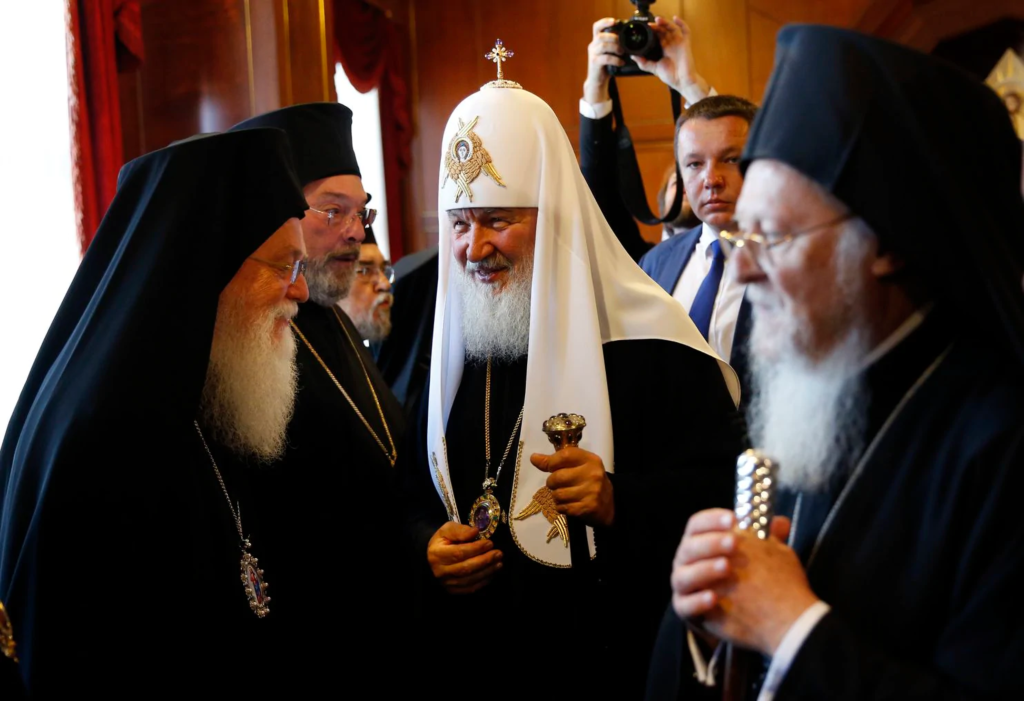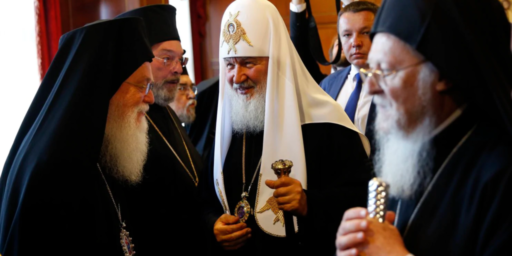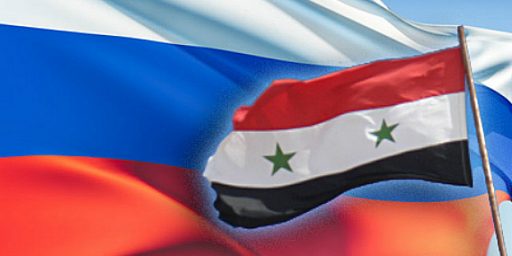Ukrainian Orthodox Church Formally Splits Away From Moscow
In a move that is likely to have political and international consequences, the Ukrainian Orthodox Church has officially severed ties with Moscow.

In a religious dispute that could have international repercussions, the Ukranian Orthodox Church has formally broken ties with the Russian Orthodox Church:
ISTANBUL — The spiritual leader of Eastern Orthodox Christians worldwide recognized the independence of the Orthodox Church of Ukraine in a four-hour ceremony in Istanbul on Sunday, formalizing a split with the Russian church to which it had been tied for more than four centuries.
Ecumenical Patriarch Bartholomew I, the spiritual leader, handed a Tomos of Autocephaly containing a decree of independence to the newly appointed Metropolitan Epiphanius of Ukraine, cleaving millions of Ukrainians from the Russian Orthodox Church.
The independence effort outraged political and religious leaders in Russia. But for President Petro O. Poroshenko of Ukraine, who stood before an elevated throne throughout the ceremony in Istanbul, the occasion was an affirmation of independence from Russian influence in his embattled country and a boost ahead of elections in March.
“Tomos for us is actually another act of proclaiming Ukraine’s independence,” Mr. Poroshenko said in an address. “For Ukrainians, our own Church is a guarantee of our spiritual freedom. This is the key to social harmony.”
Recognition of the church’s autonomy will resolve a problem for the many Ukrainians who had broken with Moscow and been declared noncanonical, he added.
The Ukrainian church had been under Moscow’s jurisdiction since 1686, when, under pressure from Russia, it abandoned allegiance to Constantinople, the historical seat of the Eastern Orthodox Church now known as Istanbul.
With that longstanding relationship threatened by tensions between Russian and Ukraine, Mr. Poroshenko, as well as nearly 200 bishops and other church figures, gathered in December in St. Sophia’s Cathedral in Kiev, the Ukrainian capital, to choose the head of the future autonomous Ukrainian church. That decision sealed the country’s intention to sever religious ties from the Russian Orthodox Church and the Moscow patriarch, Kirill I.
“I support separating from the Russian church,” said Dmytro Khanenko, 20, a Ukrainian student who was following the ceremony on Sunday, “but I don’t like how politics is involved.”
Politicians were using the issue to gain popularity, he said. “The fact that Ukraine is in conflict with Russia means it is good to show that Ukraine is less dependent on Russia,” he said.
The Moscow patriarch claims to have oversight not only of Orthodox communities in Russia but also most of the areas of the former Soviet Union, but it has been struggling to maintain its hold over what his church views as a wayward province ever since Ukraine declared independence in 1991.
Patriarch Kirill oversees the world’s largest community of Orthodox Christians, some 150 million faithful — half of the number of Orthodox Christians worldwide. The loss of Ukraine’s Orthodox faithful would shrink the number of parishes under Moscow’s control by a third.
Patriarch Bartholomew now oversees 15 separate Orthodox Churches from his seat in Istanbul, the ancient cradle of Christendom that the Orthodox still call Constantinople.
He had signed the Tomos in a civil ceremony with Mr. Poroshenko on Saturday, and sanctified it in a Mass on Sunday. The ceremony began before dawn, with priests chanting hymns under a single chandelier in St. George’s Cathedral.
The Cathedral was flooded with light as the patriarch blessed the new Metropolitan, dressed in blue, white and gold vestments and a glittering miter. As he was handed the Tomos, bells pealed and the congregation broke into applause.
(…)
Both Patriarch Bartholomew and the new autonomous Ukrainian church described the occasion not as a schism but as a long-needed alignment of Ukraine’s independent state and church.
The patriarch called on the new metropolitan not to exclude any believers from his church, including those loyal to Moscow, and urged him to build bridges and unite the people, said an official from the patriarchate, who spoke on the condition of anonymity in keeping with protocol.
“The Orthodox Church had 14 independent churches, and today it has 15,” said Nikolas Papachristou, a spokesman for the Ecumenical Patriarchate. “Together they create our Orthodox Church.”
Church and national leaders in Ukraine had been pressing for self-governance for the church for 30 years, since Ukraine became independent with the dissolution of the Soviet Union, Metropolitan Epiphanius said in a speech during the ceremony.
“With the support of the Ukrainian state and our president, the separation has been eliminated, and the unity has been restored.”
The Tomos, read out during the signing ceremony on Saturday, declares that the Metropolitan of Kiev and all Ukraine, representing the Holy Synod of Ukrainian bishops, should turn to the Patriarchate of Constantinople for all decisions in the future.
“In this way, the affairs of the church in this country will be governed, as proclaimed by the divine and holy canon, freely and in the Holy Spirit, without hindrance, without any other external influence,” it said.
As I noted when I first wrote about this in October, this dispute is mired in a mixture of politics, religion, and history that makes resolution of the dispute unlikely and the possibility of a split in the Orthodox Church that would be as historic as the one that occurred between Catholics and the Eastern Orthodox roughly 1,000 years ago. On the political and historic side, there are the links between Russia and Ukraine that can be traced back to the beginnings of Russia itself and the birth of Christianity. For Russians, Ukraine is quite literally the birthplace of both in that Russian nationhood and the beginnings of Christianity in Eastern Europe can be traced to the Kievan Rus a federation of Slavic peoples that existed from roughly the 9th to the 13th centuries. It was among this federation that Christianity first came to Eastern Europe, and thus is seen as not only the birthplace of Russia but also the birthplace of the Russian Orthodox Church. Losing control of the Orthodox Church in Russia would roughly be akin to the Catholic Church losing Vatican City, although the consequences would be quite different. Along with the fact that seizure of the Crimean Peninsula was motivated in no small part by the Russian desire to maintain control over basing rights in Odessa, these historic ties to Ukraine are one of the reasons why the Russian soft war in eastern Ukraine appears to be widely supported in Russia a whole, where the idea of a separate Ukrainian national identity is still not entirely accepted.
Not long after I first wrote about this, the Russian Orthodox Church voted to sever ties with the Patriarch, and while that didn’t constitute a completely split in the Orthodox Church, it seemed clear that it could be headed that way. With the Patriarch now taking the formal step of allowing the creation of an independent Ukrainian Orthodox Church independent of the church in Moscow, which has long seen itself as having authority over all the national churches in Eastern Europe, including Ukraine, that could come sooner rather than later. The consequences of such a split for the Orthodox Church worldwide could be significant. According to the most recently available figures, there are presently 217 million adherents to Orthodox Christianity worldwide, made up of a number of national churches in Eastern Europe and various parts of the Middle East including Lebanon, Iraq, Syria, and Egypt. Of those, the largest segment of the membership comes from those under the jurisdiction of the Moscow Patriarch, which number some 164 million, though this includes the members of the disputed Ukrainian Church. Even if Moscow loses control of the church in Ukraine, it would still far exceed the membership of what would be left of the Orthodox Church over which the Patriarch of Constantinople is considered the “first among equals.” More importantly, a split between Moscow and the Greek Church would no doubt lead other national churches either choosing sides or seeking to assert their independence from both sides, leading to a further splintering of what is, at least at the moment, the second largest Christian Church in the world.
While this may all seem like a territorial or religious dispute between two different branches of the Orthodox Church, it could have implications far beyond that. Primarily, of course, it could have a huge impact on relations between Russia and Ukraine and the ongoing rebellion in the eastern part of Ukraine that is openly receiving assistance from Russias military, if not active involvement by the Russian military itself. This is especially true given the fact that Vladimir Putin has spent the last several years tying himself to the Orthodox Church in Moscow, a move that has been largely reciprocated by the Church itself which has long survived by cozying up to whomever happens to be in power whether it was the Czars, the Soviets, or, now, Putin and his crime family of Oligarchs. Additionally, any split between Moscow and Istanbul is likely to reverberate in other parts of Eastern Europe, including the Balkans where loyalty among the Orthodox churches is divided between those loyal to Moscow and those loyal to Bartholomew the Ecumenical Patriarch. Additionally, it’s likely to lead to clashes between Moscow and Kiev over church proper, including a monastery in Kiev that is considered the birthplace of Russian Orthodoxy. This dispute is apparently so serious that it was raised by Russian President Vladimir Putin mentioned it last month during his end of the year press conference. The situation between Russia and Ukraine is hot enough already thanks to the territorial and ethnic issues involved, adding religion into the mix only seems guaranteed to make things worse. .





The co-opting of an American president? Brilliant, the intelligence coup of all time, beating out the Rosenbergs.
Invading Ukraine? Stupid. Putin already had the naval base in Crimea, he already had a Ukraine that had given up its nukes, but paranoia and hubris led our friendly neighborhood KGB agent down a path leading to sanctions, widespread condemnation, a reveal of Russia as the same old aggressive bully it was when it was the USSR, a re-arming of the West, and now a historic religious schism.
Add that to Putin’s inexplicable determination to bury himself in Syria, and what we have is a world class spy with no capacity for strategic thinking. And even his elevation of Trump, while terribly damaging to the US, its reputation, its power in the world, is hampered by the fact that Putin’s asset is an imbecile.
It reminds me vaguely of Pearl Harbor. Nice work on the battleships, Tojo, what about the refueling facilities and the aircraft carriers?
I’m fuzzy on the details, but one reason the Russian church is important has to do with the fall of Constantinople in the 1450s.
Constantinople was first set up as the capital of the Roman empire by Constantine I (hence the name), also Rome’s first Christian emperor. This is significant because it was, from the start, a Christian city (no pagan temples to Jupiter in the new capital, see.)
When it fell to the Ottomans, many natives left. Here’s where things get fuzzy for me (I’m not that interested in late medieval age), but Russia was seen as a Third Rome, as Constantinople was seen as the Second Rome after the western Roman empire fell.
It’s plain the power in the Orthodox church returned or stayed in Constantinople, hence the Patriarch now resides in Istanbul. But the Russian church remains relevant and powerful beyond its numbers.
The Russian empire, though vast, was always somewhat behind the western powers. This helped relegate the church to the lower tier the empire itself occupied. Next came the USSR, which was much more powerful politically and internationally than the empire had been, but also disdainful of religion. Now they may feel they have a savior in Putin (God help them).
I hope they don’t start a state-backed global proselytization effort.
Thank you, Doug, for bringing up Putin’s role with the Russian church. For some reason NYT, in the quoted article, didn’t feel it appropriate to mention that the Russian church is heavily aligned with Putin.
@gVOR08:
As you probably know, the Russian Orthodox Church has a long history of, well collaborating, with whoever happens to be in power in Moscow. They did it with the Czars. It was how they survived the Soviets notwithstanding the fact that there was widespread oppression against religion of all sorts under Communist control. And they are doing it with Putin, and Putin has been particularly adept at utilizing the Church for his own means as well.
@Kathy:
The Church and Putin seem to have come to see each other as mutually beneficial.
@Michael Reynolds:
I don’t think Putin is looking at invading Ukraine any more than I think he’d actually be dumb enough to try to provoke military confrontation with the NATO by moving against the Baltic States. That doesn’t mean he isn’t beyond helping to stir up chaos in places such as the eastern half of Ukraine, though. It keeps Ukraine off balance and pretty much guarantees that the E.U. and NATO will stay away. (And for the record I think admitting Ukraine to NATO would be a foolish decision.)
What is the constitutional role of the Orthodox Church in Russia and Ukraine? I know that before the Soviets seized power the church was the official state religion. Other religions were tolerated, but there were restrictions on proselytizing and other hindrances. The USSR was officially atheistic. Is the Orthodox Church merely the most popular, or does it have a special formal place in their constitution? If the church and state are intermingled as is common in many nations this is a big deal. I know there is a Ukrainian national variant of Catholicism, but I don’t know how influential it is.
@Doug Mataconis:
For what profits a church if it gains a sliver of the world and loses its soul?
@Doug Mataconis: I’ve seen claims that making threatening noises around the Balkans is intended as a diversion from Ukraine.
@Kathy:
“Constantinople was first set up as the capital of the Roman empire by Constantine I (hence the name), also Rome’s first Christian emperor. This is significant because it was, from the start, a Christian city (no pagan temples to Jupiter in the new capital, see.)”
No, the city existed for centuries under the name Byzantium before the name was changed to honor Constantine after his death. That’s why the Eastern part of the Roman Empire is typically called the Byzantine Empire after the fall of Rome.
@gVOR08: There is also the growing outreach by the Russian Orthodox Church (and by extension, Russian government) to some of the right wing evangelical churches here and elsewhere around the world. Just think of it. Russian ties to the right wing NRA, ties to right wing American churches, ties to Trump. Kind of seeing a pattern here. A lot of smoke.
@Moosebreath:
I’m very careful with my phrasing, also perhaps very subtle. “first set up as the capital of the Roman empire” perhaps did not capture the notion a city already existed there, but wasn’t the capital of the Roman empire..
BTW, the Byzantine Empire never called itself anything other than the Roman Empire. I think historians call it the Byzantine Empire so they can continue to date the fall of the Roman Empire to the fifth century CE rather than the fifteenth, because only Europe really counts (and only real Europe, not the Balkans) 🙂
@Kathy:
You also said “from the start, a Christian city (no pagan temples to Jupiter in the new capital”, which would not be true for a city which existed for centuries before.
@Moosebreath:
Touche
They’re only doing this so that poor Rod Dreher’s spiritual odyssey will continue.